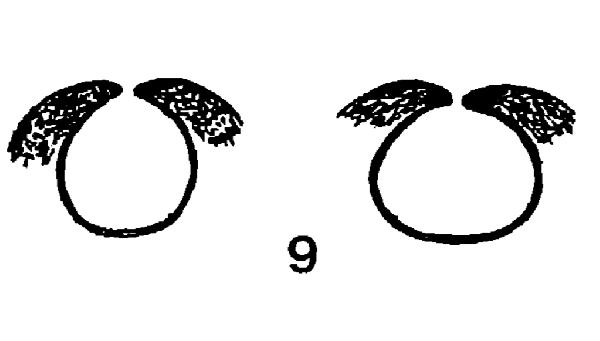Verrucaria sbarbaronis B. de Lesd.
Bull. Soc. Bot. France, 94: 199, 1948.
Synonyms:
Distribution: N - Lig.
Description: Thallus crustose, endosubstratic or hemiendosubstratic, whitish to pale ochre-coloured. Perithecia black, immersed in shallow pits of the rock, hemispherically projecting. Involucrellum black, reaching down to 1/3 to half of the perithecium, rather thick, lacerate and poorly delimited in lower part, impregnated with substrate granules and crystals; exciple globose, 0.4-0.6 mm across, the wall black throughout; hamathecium of 40-60 µm long, thin, branched and anastomosing periphyses and periphysoids, interascal filaments absent; hymenial gel hemiamyloid, I+ red (I+ blue at very low concentrations of I), K/I+ blue. Asci 8-spored, clavate, I-, fissitunicate, the wall thickened above, with an ocular chamber, dehiscent by extrusion of an endotunica to form a delicate rostrum, Verrucaria-type. Ascospores 1-celled, hyaline, broadly ellipsoid, 20-26 x 11-15 µm. Photobiont chlorococcoid. Spot tests: K-, C-, KC-, P-, UV-. Chemistry: without lichen substances.Note: this poorly known calcicolous species is known also from Austria, Slovenia and Greece. For further details see Breuss (2008, 2008b). The ecological indicator values are tentative.
Growth form: Crustose endolithic
Substrata: rocks
Photobiont: green algae other than Trentepohlia
Reproductive strategy: mainly sexual
On otherwise dry surfaces with short periods of water seepage after rain
Poorly known taxon in need of further study
Commonnes-rarity: (info)
Alpine belt: absent
Subalpine belt: absent
Oromediterranean belt: absent
Montane belt: very rare
Submediterranean belt: very rare
Padanian area: absent
Humid submediterranean belt: absent
Humid mediterranean belt: very rare
Dry mediterranean belt: very rare

Predictive model
Herbarium samples
Growth form: Crustose endolithic
Substrata: rocks
Photobiont: green algae other than Trentepohlia
Reproductive strategy: mainly sexual
On otherwise dry surfaces with short periods of water seepage after rain
Poorly known taxon in need of further study
Commonnes-rarity: (info)
Alpine belt: absent
Subalpine belt: absent
Oromediterranean belt: absent
Montane belt: very rare
Submediterranean belt: very rare
Padanian area: absent
Humid submediterranean belt: absent
Humid mediterranean belt: very rare
Dry mediterranean belt: very rare

Predictive model
| Herbarium samples |
 INDEX FUNGORUM
INDEX FUNGORUM
 GBIF
GBIF


